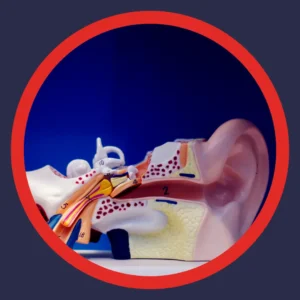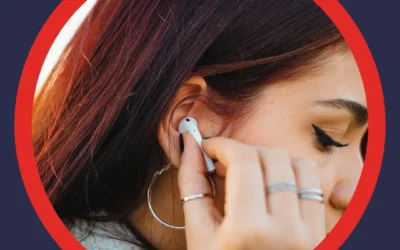When most people think of hearing loss, they picture aging or loud noise. But many forget one major cause: common medications. Known medically as “ototoxic drugs,” these substances can damage the inner ear and affect both hearing and balance.
These medications aren’t rare. In fact, many are found in everyday medicine cabinets or prescribed regularly for serious health conditions. And while not everyone who takes these medications experiences hearing problems, knowing the risks can help you protect your ears.
Let’s explore which common medications are most likely to cause hearing issues, how ototoxicity works, and what you can do to prevent long-term damage.
Discover more about hearing insurance benefits.
What Is Ototoxicity?
Ototoxicity occurs when a drug or chemical damages the structures of your inner ear. The word comes from “oto” meaning ear, and “toxic” meaning poisonous. Over 200 known drugs have the potential to be ototoxic.

These medications may damage the cochlea (responsible for hearing) or the vestibular system (responsible for balance). Damage can occur quickly or build over time. Some people experience symptoms immediately. Others may not notice problems until months—or even years—after taking the medication.
Common signs of ototoxicity include:
- Tinnitus (ringing or buzzing in one or both ears)
- Sudden or gradual hearing loss
- Feeling lightheaded, dizzy, or unsteady
- Difficulty balancing, especially in the dark
- Perception that stationary objects are moving (oscillopsia)
In children, the symptoms may be harder to spot. Look for difficulty understanding speech, delayed language development, or frequent exhaustion in learning environments.
1. Antibiotics That May Cause Hearing Loss
Some of the most well-documented ototoxic medications belong to the antibiotic family, particularly when administered in high doses or intravenously.
Aminoglycoside antibiotics include:
- Gentamicin
- Tobramycin
- Amikacin
- Streptomycin
- Neomycin
- Paromomycin
- Plazomicin
These antibiotics are powerful and usually reserved for serious infections like meningitis, endocarditis, or resistant UTIs. They are often given in hospitals through IVs. Unfortunately, they can be highly toxic to the hair cells in the cochlea.
Even more concerning, these drugs can linger in inner ear fluid long after treatment ends. This delayed-onset ototoxicity means damage may continue even after you’ve stopped the medication.
Other ototoxic antibiotics include:
- Erythromycin
- Clarithromycin
- Azithromycin
- Vancomycin
- Capreomycin (used for drug-resistant tuberculosis)
- Tetracycline and doxycycline
These antibiotics may be more likely to cause hearing issues in people with kidney problems or when used in newborns and children. Some topical ear drops (e.g., Cortisporin) also contain ototoxic ingredients like neomycin.

2. Over-the-Counter Pain Relievers
You may think OTC pain relievers are completely safe, but some can increase your risk of hearing loss—especially when taken regularly or at high doses.
Examples include:
- Aspirin: Doses over 6 grams per day (about 8–12 tablets) may cause temporary or permanent hearing loss.
- NSAIDs: Nonsteroidal anti-inflammatory drugs like ibuprofen (Advil, Motrin) and naproxen can interfere with blood flow to the ear.
- Acetaminophen (Tylenol): Though less studied, it may raise the risk of hearing loss by increasing oxidative stress or blood pressure.
Studies show that men under 60 and women who take OTC painkillers regularly are more likely to experience hearing problems. Using pain relievers during pregnancy may also increase the risk of congenital hearing loss in newborns.
Key takeaway: Don’t exceed recommended dosages. Let your doctor know about any long-term OTC use.
3. Loop Diuretics and Water Pills
Loop diuretics are prescription medications used to reduce fluid buildup in the body. They help treat:
- High blood pressure
- Congestive heart failure
- Kidney or liver disease
- Edema and ascites
Common ototoxic diuretics include:
- Furosemide (Lasix)
- Bumetanide (Bumex)
- Ethacrynic acid (Edecrin)
- Torsemide
These medications may temporarily increase the permeability of the cochlear wall, allowing harmful substances to reach delicate hearing structures. While hearing loss is usually reversible, some cases result in permanent damage—especially when given intravenously or combined with other ototoxic drugs.
4. Chemotherapy Medications
Platinum-based chemotherapy drugs are among the most ototoxic medications. They are used to treat aggressive or advanced cancers.
Most common offenders:
- Cisplatin: Used for bladder, ovarian, and testicular cancers
- Carboplatin: Used when cisplatin’s side effects are too severe
- Oxaliplatin: Often used for colorectal cancer
As many as half of patients receiving cisplatin experience hearing loss. The damage is often bilateral (both ears) and permanent. Tinnitus and vertigo are also common side effects.
Because of their life-saving potential, chemotherapy drugs cannot always be substituted. However, hearing monitoring before, during, and after treatment can help manage side effects effectively.
5. Opioids and Narcotic Pain Medications
Opioids are powerful medications used to treat severe or chronic pain. Unfortunately, they are also capable of causing sudden hearing loss.
Risky opioids include:
- Oxycodone (OxyContin)
- Fentanyl
- Hydrocodone (Vicodin)
- Morphine
- Methadone
- Heroin
Reports of hearing loss related to opioids have increased, especially in cases of overdose or misuse. Hearing changes may occur suddenly and without warning.
Important note: Always take opioids exactly as prescribed. If you experience tinnitus or muffled hearing, contact your doctor immediately.
Read here if you’re considering ear candling for muffled hearing.
6. Medications for Erectile Dysfunction
Phosphodiesterase-5 (PDE5) inhibitors are prescribed for erectile dysfunction and pulmonary hypertension. Rare but documented cases of hearing loss have been linked to:
- Sildenafil (Viagra)
- Tadalafil (Cialis)
- Vardenafil (Levitra)
- Avanafil (Stendra)
A study found a strong association between hearing loss and sildenafil. While the overall risk is low, hearing changes should be reported promptly.
7. Anti-Malaria and Autoimmune Drugs
Drugs used to treat malaria or autoimmune diseases can sometimes cause hearing damage.
Includes:
- Quinine
- Chloroquine
- Hydroxychloroquine (Plaquenil)
These medications may cause tinnitus, dizziness, or hearing loss—sometimes even after short-term use. Most symptoms resolve once the drug is stopped, but not always.
Other Factors That Increase Risk
Your likelihood of experiencing ototoxicity depends on several factors:
- Drug dosage and treatment duration
- Pre-existing hearing or kidney conditions
- Concurrent use of multiple ototoxic drugs
- Genetic vulnerability
- Noise exposure during treatment
Key insight: Some people carry a gene that increases their risk when taking aminoglycosides. Discuss this with your provider if you have a family history of hearing loss.
Find out more about stress and hearing loss.
How to Protect Your Hearing
You can’t always avoid ototoxic medications. But you can take steps to monitor and protect your hearing.
Tips for hearing safety:
- Request a baseline hearing test before starting treatment.
- Schedule periodic hearing exams during treatment.
- Ask about non-ototoxic alternatives when possible.
- Avoid loud environments while on ototoxic drugs.
- Report any sudden hearing changes or balance issues immediately.
Never stop a medication without consulting your provider—even if you suspect it’s harming your hearing.
Explore all about hearing tests.
What to Do If You Notice Hearing Loss
If you begin to notice hearing changes after starting a new medication, act fast:
- Call your hearing care provider.
- Schedule a full hearing exam.
- Bring a list of your current medications.
- Discuss alternatives or hearing support options.
Early intervention improves outcomes. If hearing loss is caught early, we can often help manage or minimize its impact.

How American Hearing + Audiology Can Help
At American Hearing + Audiology, we understand how overwhelming hearing changes can be—especially when they come as a side effect of necessary treatment.
We offer:
- Free baseline hearing assessments before you start ototoxic medications
- Ongoing monitoring for drug-related hearing loss
- Counseling on medication side effects and treatment options
- Hearing aids and devices tailored to your lifestyle and needs
- Tinnitus support and relief strategies
You don’t have to face hearing loss alone. We’re here to guide you every step of the way.
Don’t Ignore the Warning Signs
More than 200 medications have the potential to damage your hearing. Many of these drugs are critical to treating serious conditions, so the benefits may outweigh the risks. Still, being informed helps you and your healthcare team make smart choices about your care.
If you suspect a medication is affecting your hearing, take action early. The sooner you get help, the better your chance of preserving your hearing.
Schedule Your Appointment Today
Don’t wait for hearing loss to become permanent. Contact American Hearing + Audiology for a complete evaluation, expert guidance, and personalized care.



